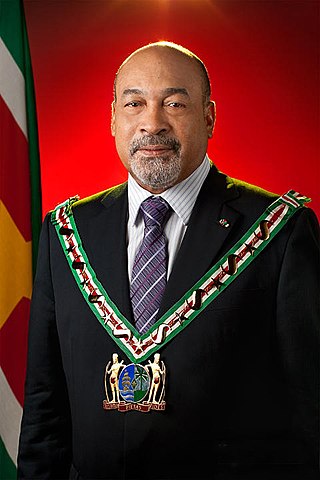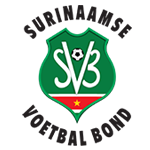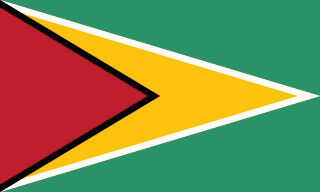
Suriname competed at the 2011 World Aquatics Championships in Shanghai, China between July 16 and 31, 2011.

Suriname competed at the 2011 World Aquatics Championships in Shanghai, China between July 16 and 31, 2011.
Suriname qualified 3 swimmers. [1]
| Athlete | Event | Heats | Semifinals | Final | |||
|---|---|---|---|---|---|---|---|
| Time | Rank | Time | Rank | Time | Rank | ||
| Diguan Pigot | Men's 100m Breaststroke | 1:06.00 | 67 | did not advance | |||
| Men's 200m Breaststroke | 2:27.21 | 51 | did not advance | ||||
| Marcelino Richaards | Men's 50m Butterfly | 25.36 | 33 | did not advance | |||
| Men's 100m Butterfly | 56.51 | 48 | did not advance | ||||
| Athlete | Event | Heats | Semifinals | Final | |||
|---|---|---|---|---|---|---|---|
| Time | Rank | Time | Rank | Time | Rank | ||
| Chinyere Pigot | Women's 50m Freestyle | 26.19 | 32 | did not advance | |||
| Women's 100m Freestyle | 57.34 | 41 | did not advance | ||||

Suriname, officially the Republic of Suriname, is a country in northern South America, sometimes considered part of the Caribbean and the West Indies. It is a developing country with a medium level of human development; its economy is heavily dependent on its abundant natural resources, namely bauxite, gold, petroleum, and agricultural products. Suriname is a member of the Caribbean Community (CARICOM), the United Nations, the Organisation of Islamic Cooperation and the Organization of American States.
The economy of Suriname was largely dependent upon the exports of aluminium oxide and small amounts of aluminium produced from bauxite mined in the country. However, after the departure of Alcoa, the economy depended on the exports of crude oil and gold. Suriname was ranked the 124th safest investment destination in the world in the March 2011 Euromoney Country Risk rankings.
Telecommunications in Suriname includes radio, television, fixed and mobile telephones, and the Internet.

Paramaribo is the capital and largest city of Suriname, located on the banks of the Suriname River in the Paramaribo District. Paramaribo has a population of roughly 241,000 people, almost half of Suriname's population. The historic inner city of Paramaribo has been a UNESCO World Heritage Site since 2002.

Desiré Delano Bouterse was a Surinamese military officer, politician, convicted murderer, and drug trafficker who served as President of Suriname from 2010 to 2020. From 1980 to 1987, he was Suriname's de facto leader after conducting a military coup and establishing a period of military rule. In 1987, Bouterse founded the National Democratic Party (NDP). On 25 May 2010, Bouterse's political alliance, the Megacombinatie, which included the NDP, won the parliamentary elections, and on 19 July 2010, Bouterse was elected as President of Suriname with 36 of 50 parliament votes. He was inaugurated on 12 August 2010.

The Suriname national football team represents Suriname in international football. The team is controlled by the Surinamese Football Association, which is a member of CONCACAF.

The Guyana national football team, nicknamed the Golden Jaguars, represents Guyana in international football and is controlled by the Guyana Football Federation. It is one of three South American nations to be a member of the Caribbean Football Union of CONCACAF alongside Suriname and French Guiana. Until the independence of Guyana (1966), it competed as British Guiana. They qualified for the Caribbean Nations Cup in 1991, coming fourth, and in 2007. Guyana has never qualified for the FIFA World Cup, but on 23 March 2019 they qualified for the first time for the CONCACAF Gold Cup.

Moengo is a town in Suriname, located in the Marowijne district, between Paramaribo and the border town Albina on the Cottica River. Moengo is also a resort (municipality) in the district of Marowijne. Moengo was the capital of Marowijne District between 1932 and 1945. The current capital is Albina.

The Suriname national cricket team is the team that represents Suriname in international cricket. The team is organised by the Suriname Cricket Board, which has been an affiliate member of the International Cricket Council (ICC) since 2002 and an associate member since 2011.

Indo-Surinamese, Indian-Surinamese, or Hindustani Surinamese are nationals of Suriname who trace their ancestry to the Indian subcontinent. Their ancestors were indentured labourers brought by the Dutch and the British to the Dutch colony of Suriname, beginning in 1873 and continuing during the British Raj. Per the 2012 Census of Suriname, 148,443 citizens of Suriname are of Indo-Surinamese origin, constituting 27.4% of the total population, making them the largest ethnic group in Suriname on an individual level. They are a subgroup of Asian Surinamese and Indo-Caribbean people.
The SVB Eerste Divisie is the second highest football championship for clubs run by the Surinaamse Voetbal Bond. The league currently comprises twelve teams and operates a system of promotion and relegation. Seasons run from November to June of the next year, with teams playing 30 games in the regular season. The league was known as the Hoofdklasse but became Topklasse beginning with the 2016–17 season, and then from the 2017–18 season forward, the Eerste Divisie. In 2024 the SVB introduced a new professional competition while the Eerste Divisie will serve as the nations top amateur competition.

Surinamese people are people who identify with the country of Suriname. This connection may be residential, legal, historical or cultural. For most Surinamese, several of these connections exist and are collectively the source of their being Surinamese.

The 1980 Surinamese coup d'état, usually referred to as the Sergeants' Coup, was a military coup in Suriname which occurred on 25 February 1980, when a group of 16 sergeants of the Surinamese Armed Forces (SKM) led by Dési Bouterse overthrew the government of Prime Minister Henck Arron with a violent coup d'état. This marked the beginning of the military dictatorship that dominated the country from 1980 until 1991. The dictatorship featured the presence of an evening curfew, the lack of freedom of press, a ban on political parties, a restriction on the freedom of assembly, a high level of government corruption, and the summary executions of political opponents.

Chandrikapersad "Chan" Santokhi is a Surinamese politician and former police officer who is the 9th president of Suriname, since 2020. After winning the 2020 elections, Santokhi was the sole nominee for president of Suriname. On 13 July, Santokhi was elected president by acclamation in an uncontested election. He was inaugurated on 16 July.
Miss Suriname is a national Beauty pageant in Suriname. The pageant is now under Tropical Beauties Suriname Foundation which selected the titleholders to Miss World, Miss Universe, Miss International, Miss Earth, Miss Supranational and Mister Supranational.

Indonesia and Suriname established diplomatic relations on 24 January 1976. Both had a special relationship, based upon shared common history as former colonies of the Dutch Empire. Large numbers of Javanese migrated to Suriname to work on plantations during the late 19th and early 20th-centuries. Indonesia has an embassy in Paramaribo also accredited to the Co-operative Republic of Guyana, while Suriname has an embassy in Jakarta. Indonesia and Suriname are members of the World Trade Organization (WTO) and Forum of East Asia-Latin America Cooperation.
Werehpai is an archaeological site in Suriname consisting of several caves containing petroglyphs of pre-Columbian origin. The site is located about 10 kilometres (6.2 mi) from the village of Kwamalasamutu. With 313 identified petroglyphs, Werehpai is by far the largest pre-Columbian petroglyph site known in Suriname, and perhaps the largest in all of the Guianas.
The COVID-19 pandemic in Suriname was caused by Severe acute respiratory syndrome coronavirus 2. The virus was confirmed to have reached Suriname on 13 March 2020. The case was a person who travelled from the Netherlands the previous week. On 3 April 2020, one person died. On 3 May 2020, all nine cases had recovered. On 18 May, an eleventh case was identified.

Diplomatic relations between France and Suriname were established on 25 August 1976. Suriname and the French overseas department of French Guiana share a common border of 520 kilometres (320 mi). Suriname operates an embassy in Paris, a consulate in Cayenne, and an honorary consulate in Saint-Laurent-du-Maroni. France operates an embassy in Paramaribo, a consulate in Georgetown, Guyana, and an honorary consulate in Albina.